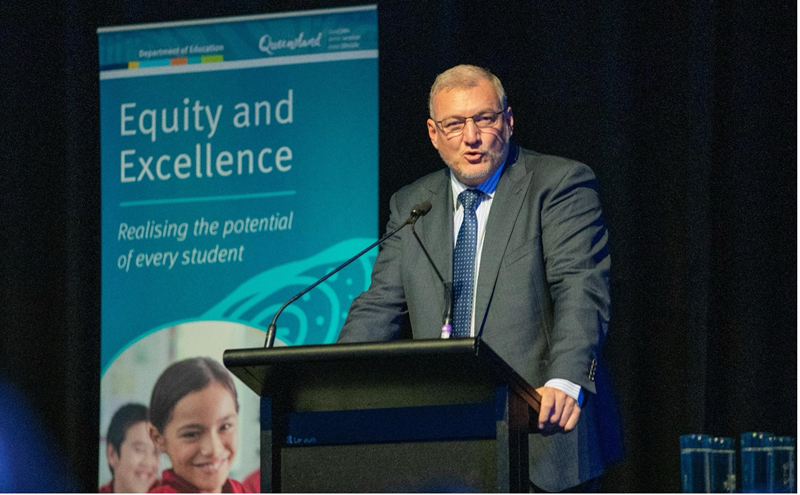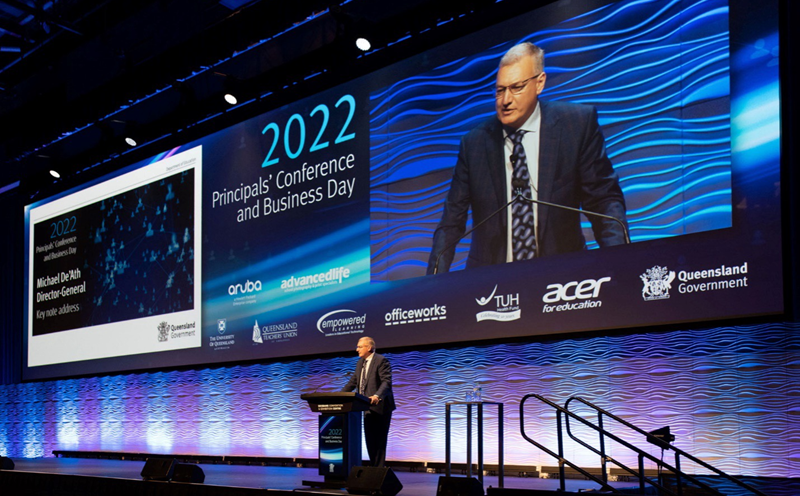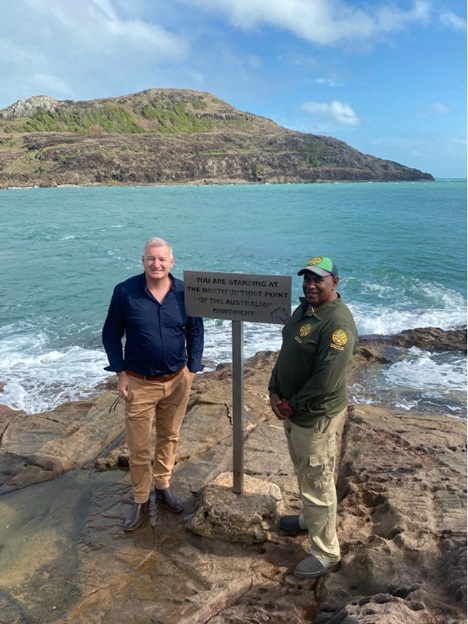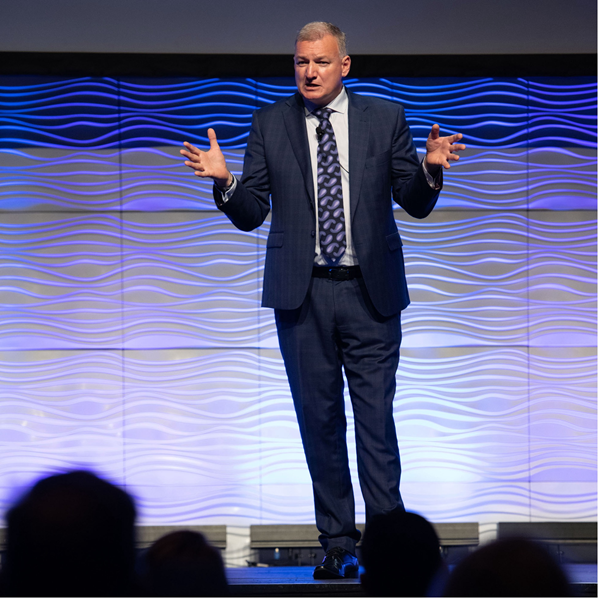From New Zealand classrooms to global leadership: transforming education and public service
Michael De’Ath, a distinguished alumnus of Te Kunenga ki Pūrehuroa Massey University, embodies the transformative power of education and the far-reaching impact of dedicated public service. With a Master of Educational Administration (First Class Honours) and a Bachelor of Education from Massey, Michael’s journey from his early days in New Zealand to his role as a prominent public service leader in Australia showcases his dedication to education and community development.
Following in his father’s footsteps
Born in Rangiora north of Christchurch, Michael’s upbringing was deeply influenced by his father, a school principal, author and researcher. Reflecting on his early years, Michael shares, “one year after I was born, we went to live in the Cook Islands for two years and then Niue Island from age 7-9. The early years of my life spent in the Pacific Islands significantly shaped my worldview and connection with the Pacific.”
Michael began his schooling in the deep south, Invercargill. After returning from Niue Island the family settled in Christchurch. He recalls, “we returned to Christchurch to settle, where I completed my secondary schooling. Honestly, I didn’t do too well at school in the traditional sense of academia. I didn’t get university entrance but managed to secure enough points through the then Sixth Form Certificate, to get into Christchurch Teachers College.”
This unconventional start in academia did not deter Michael. His perseverance led him to Massey University, following in his father’s footsteps. “I chose Massey University because that was my father’s university and I could also study extramurally. My father was the first person in his family ever to get a university degree,” he shares. Over the following years, while teaching and working as a principal, Michael pursued his studies at Massey, culminating in undergraduate and postgraduate degrees.
 A picture of a Teddy Bear that one of Michael’s daughters (Sophie) made up for his Massey Masters in Educational Administration graduation
A picture of a Teddy Bear that one of Michael’s daughters (Sophie) made up for his Massey Masters in Educational Administration graduation
Michael attributes a significant part of his success to the mentorship and guidance he received throughout his academic and professional journey. He met Professor Mark Brown at Massey when his interest in emerging technologies was piquing. Michael says,
“Mark had a strong interest in cognitive science, especially its applications in gaming and related areas. There are always a few things you remember about certain people, and one thing that stuck with me from Mark was during a conversation about academic writing. Mark said, ‘writing is about thinking.’ He might not even recall saying that, but it profoundly changed my perspective on academic writing. Mark was incredibly supportive and enthusiastic, which made a lasting impact on me.”
He fondly remembers mentors like Emeritus Professor Wayne L. Edwards, whose pragmatic approach to leadership and organisational psychology profoundly influenced him. “Wayne had such a pragmatic view on leadership. The study of leadership and organisational psychology became my primary interest in my academic study because of him. He was deeply knowledgeable, kind, generous, genuine, and sincere,” Michael reflects.
Another influential figure at Massey was Marian Court, who got him thinking about women and leadership. “Marian awakened my interest in questions about gender in teaching, management and leadership. I learned a lot about aspects of feminism from her work and this has informed my approach to collaborative and inclusive leadership. She was a very sound, considered person from whom I learned a lot.”

Michael led Queensland to its new education strategy Equity and Excellence – a commitment to educational achievement, wellbeing and engagement, and culture and inclusion in every school and for every student.

At the 2022 Principals’ conference in Brisbane, Michael challenged 2,000 educational leaders to think big and design their own reform journey.
An extraordinary leadership odyssey
Michael’s career, particularly over the past two decades has been marked by significant contributions to the public sector in education, health, and community services in New Zealand and Australia. His roles have included Director-General of Education in Queensland, Deputy Secretary at the Department of Health and Human Services Victoria, and Director-General of the ACT Government Community Services and Health Directorates. In these roles, Michael has demonstrated an exceptional ability to manage complex priorities, set strategic directions, and lead significant policy and organisational reforms. “Throughout my career, I’ve delivered outcomes within different jurisdictions and across various portfolios. These roles have honed my strength in managing large and complex organisations and portfolios, and setting the strategic direction for future systems,” he explains.
Numerous challenges and significant achievements mark Michael’s career. Moving from school leadership to government bureaucracy was a pivotal moment. “The first three months were terrible; I felt like I was in a foreign land. But then I started to understand how to add value,” he recalls. His ability to adapt and thrive in different environments shows his resilience and strategic thinking. Michael says, “It’s really important for you to find your value proposition quickly when you enter new roles.”
Michael’s tenure as Director-General of Education in Queensland since 2021 has been particularly impactful. “This is an extremely large department of more than 95,000 staff and an annual budget nearing 20 billion dollars. The responsibility is huge but so is the opportunity”. He has leveraged his extensive experience to drive system-wide improvements, emphasising equity and excellence in education. “Without equity, you will not have excellence, and you certainly won’t have uniform excellence. We are grappling with challenges like how to get high-quality expert teaching to students in a discrete indigenous community or parts of a large decentralised state like Queensland. We must think transformationally now, using not only what we know about teaching and learning but also technology and good system supports to schools to achieve this.”
His period as Director-General for the ACT Health Directorate was also marked by significant accomplishments. He led and managed a complex Directorate with approximately 7,500 staff and an annual budget of around $1.7 billion. At his appointment, the Directorate faced executive leadership instability and several key challenges, including the Government’s decision to split the Directorate into two entities and a critical accreditation crisis at Canberra Hospital.
“When I took on the hospital accreditation crisis, there were 33 failed outcomes in the mental health, clinical practise and governance areas. The Australian health authorities advised me that this was one of the worst results seen and doubted we could achieve the necessary improvements in three months, but we did. It was an immense effort, and I was extremely proud of everyone involved,” he shares. Michael continues,
“What did that mean? It meant better working conditions for staff in our kitchens and laundry services, improved hygiene standards, and more doctors washing their hands. It may sound basic, but it’s essential to a high-performing health system. Vulnerable individuals in our mental health units were no longer at risk. We approached the three-month timeframe like an emergency, and the successful outcome made me very proud of our team.”

Michael’s job has taken him to most amazing places – like here with Traditional Owner Michael Solomon at the Northernmost point of Australia.

Connecting with young scientists at Kalkie State School in regional Queensland in celebration of their Great Barrier Reef Guardian programme.
View on leadership in crisis management
Michael’s extensive crisis management experience, particularly in the Department of Health and Human Services in Victoria, has reinforced his views on key lessons of leadership. During this period, he directed strategic initiatives to enhance the Department’s crisis preparedness and response systems, addressing issues identified during the COVID-19 pandemic. He coordinated critical response activities to implement government directions and decisions effectively, saying,
“One of the most important aspects I emphasise to my team is executive composure. People tend to remember the moments you lose your composure far more than the times you maintain it. Regardless of the situation, it’s crucial to keep your composure, especially during challenging times like the pandemic. You’ll lose your team if you start to unravel. It requires enormous discipline, particularly when you feel like everything is falling apart. During the pandemic, the situation was incredibly challenging, and it was vital to have strong assurance mechanisms. You needed to be confident that when someone said a task was done, it was indeed completed, being executed, or in progress.”
One of Michael’s career highlights was working with the Australian Defence Forces during Victoria’s response efforts. “I had never worked with any defence forces before, and I found them incredibly professional, logistically strong, and highly structured. It was a real learning experience and a privilege to witness their efficiency.”
Michael’s advice for crisis leadership is straightforward: “maintain composure, be considerate, clearly define roles, and trust your team while ensuring tasks are completed. It’s about balancing focus and discipline with trust and assurance.”
He emphasises the importance of staying curious and open-minded for aspiring public sector leaders. “Be one upon whom nothing is lost. Be a sponge. Absorb everything you see, hear, and read. By being naturally curious, we can become a blend of all our life experiences. Reflect on why people are amazing, how they operate, and what makes them exceptional. Then consider how that’s relevant to you.”
Michael believes that successful leadership involves listening to feedback, collaborating with others, and maintaining humility. “You’re not the source of all knowledge, so support your people and help them think through challenges. Have some courage. Great leaders often stand up with conviction and are willing to be counted for something. It’s important to me to do that. But achieving that is something we need to work out together.”

Michael never underestimates the importance of personally and regularly connecting with all leaders, no matter how big the system. “They are the people who will take your vision and lead it on the ground.” Michael travels a large state to speak with every Principal, every year.
Vision for the future
Looking ahead, Michael is passionate about driving further change in education and public sector more broadly. He recognises the need for innovative approaches to address the evolving educational challenges, particularly in a decentralised state like Queensland. “Education has to change just as the communities around us are continuing to change. Thinking that education is only about a school, four walls, and a teacher is outdated. We’ll never be able to supply that system with expert teachers. It’s essential to rethink and transform our systems now.”